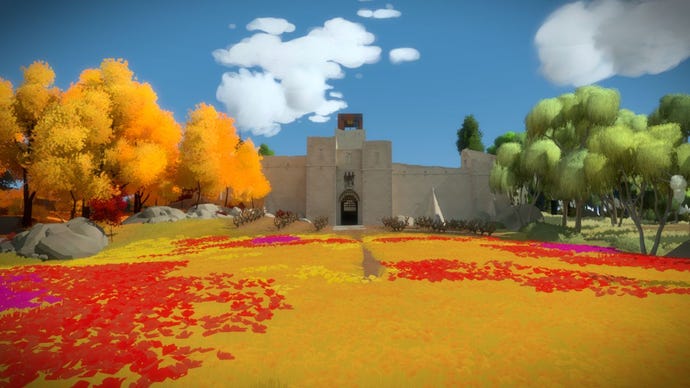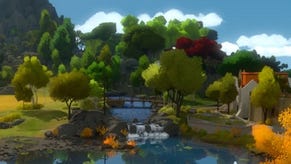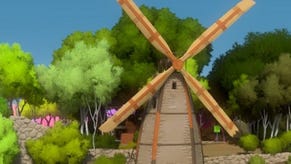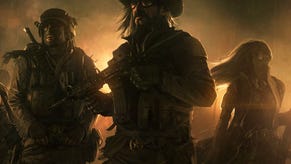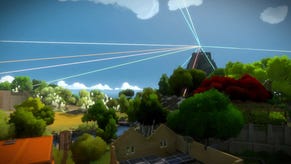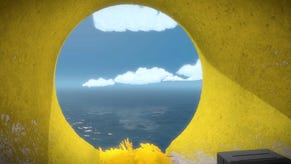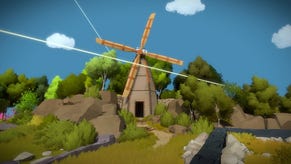The Witness Review - Do yourself a favour: don't use a guide
The Witness is the best puzzle game I have ever played and I resent every moment I'm not smashing my brain against its mysteries.
"I've got The Witness inbound so I'm gonna be busy with that," I told a colleague during a schedule check in.
"That's J-Blow's new one, isn't it? What is it? Braid 2?"
"Oh, it's sort of like Myst I guess, puzzler and walking simulator."
"Ugh, f**k no," they said.
You solve a series of mazes and it seems like nothing has happened, but instead of a door opening in the game world it opens in your brain.
I can't blame them. Puzzle adventure games deserve their poor reputation. Fervent fans may rave about them, but everyone else is perfectly justified in complaining about the lack of logic, the constant slow back and forth between keys and doors, the sudden and wounding difficulty spikes and the pixel hunting.
The Witness is not like that. The Witness is what puzzle adventure games dream of being in the innermost recesses of their hearts. The Witness is the version of puzzle adventure games that puzzle adventure games' wife sees when she looks at puzzle adventure games. The Witness is puzzle adventure games the way you remember them when you're wearing bottle-thick nostalgia glasses: mysterious, beautiful, intuitive, challenging and gloriously rewarding.
Early access to games is a double-edged sword. On the one hand, you have plenty of time to assess the game before embargo. On the other, you can't go on Twitter and ask for help when you get stuck.
I got really, horribly stuck in the first room of The Witness. I spent maybe two hours in there trying to solve the first proper puzzle of the game. Eventually I wrote off to the PR who'd supplied my copy and asked for help. I couldn't possibly write anything meaningful about the game after only seeing one room, right?
To my surprise, I was politely refused. Jonathan Blow, it seems, doesn't approve of hints.
I wrote off and asked for help. I was refused. Jonathan Blow doesn’t approve of hints. For the next few days I had some very dark thoughts about Jonathan Blow.
For the next few days I had some very dark thoughts about Jonathan Blow and the elitism of indie auteurs, as I periodically checked back in to see if I'd magically become smarter. Then the same PR rep coughed up a PS4 code, and upon loading up that version, I solved the puzzle within literal seconds.
Turns out my Windows box and The Witness don't really get on, and there were a load of assets either not loaded in or completely transparent. (As an aside, my gaming rig is apparently ancient and terrible now, but I couldn't get the game to run well even on the low spec setting, so do check the minimum system requirements and PC reviews before committing). As soon as I could actually see the puzzle, I grasped the solution immediately, organically.
I wish this had been my very first taste of The Witness but I'm pleased to report that having escaped the first room I have had nothing but positive experiences, and now I, too, don't believe in hints.
I have never experienced puzzle design as good as that in The Witness. The puzzles, and the way they're presented, should not exist; they belong in the limbo of marketing speak alongside visceral combat and other over-promised, never-delivered concepts. The Witness is that long-fabled puzzle game that teaches you to play it in the act of doing so, that massages and prods and pokes at your brain until you suddenly give a heave and a grunt and grow 6 million new dendrites and discover a new way of thinking about spatial relativity.
How in the heck was I ever supposed to finish this game when the first thing I saw out of the tutorial area made absolutely no sense to me?
The first area of the island you visit during The Witness is home to a set of puzzles that must be solved to open the gate to the rest of the game. These puzzles are not hard; they're there to teach you how to use the slider, which is the primary puzzle solving mechanic. Basically, every puzzle board in The Witness is a maze, and your job is to get from A to B - something like drawing a circuit board.
All sorts of secondary rules and complicating factors come into play in different areas of the island, and almost as soon as you escape that first garden you'll come across puzzles of a type you've never seen before, with no explanation or hint as to how you should proceed.
My first sight of one of these made me feel physically nauseous; how in the heck was I ever supposed to finish this game when the first thing I saw out of the tutorial area made absolutely no sense to me?
The real beauty of the Witness kicks in here, and it's twofold. First, when you come across something that terrifies, bewilders or stumps you, you can just slouch off somewhere else, exploring the almost totally open world of the island until you find something to do that doesn't make you feel like you're thinking through treacle. Not only does this encourage you to use one of the best puzzle-solving tactics of all time (going away and ignoring it for a few minutes while your subconscious bangs away at it), it means you never feel like you've either got to use a guide or accept that you've wasted your money.
Impossible, incomprehensible puzzles melt into simple exercises after you’ve visited nearby locations.
Secondly, the geographical spacing of the puzzles is such that when you do wander off somewhere else, you're likely to find something that teaches you everything you need to tackle whatever it was that you're running away from. I can't overstate how well done this is; impossible, incomprehensible puzzles melt into simple exercises after you've visited nearby locations. You solve a series of mazes and it seems like nothing has happened, but instead of a door opening in the game world it opens in your brain. The next time you look back at your nemesis it has had its teeth pulled and cowers before your mental might.
Amazing: an honest-to-goodness learning curve. A game that literally gives you the tools you need to beat it, when that sort of claim is usually just the wistful dream of designers seized upon by marketers.
By presenting the maze puzzles of The Witness in the context of a first person exploration game (a walking simulator, if that's the kind of phrase you like to use), Blow has imbued the whole business a beauty and atmosphere that puts it alongside games like Myst, and elevates it above, say, a mobile game that just presents board after board for you to solve. No matter how well-designed vanilla puzzle games are, they can't match the pleasure of exploring an inetresting 3D world.
But more than that, the puzzles in The Witness couldn't have been presented as flat boards. Many of them leverage the environment in surprising and occasionally agonising ways; the effort of wrenching your brain into an alternate mode of thought when you discover a new variation of puzzle almost feels physical.
Sitting straight up in bed at one in the morning with an answer simmering in my brain, I’d exclaim “You utter bastard” into the dark.
Every time you figure out a new variation you delight in your own cleverness, but then the real work begins. By the time you reach the last half of a sequence of puzzles within a particular variation, your brain feels like it's been through a meat tenderiser. The difficulty curve becomes vertical as you push and shove at your own thought processes, inching them up and over the peak until you come roaring down the other side of the gestalt switch in screaming triumph, alternately praising and cursing yourself for how long it took you to grasp the elegant simplicity of what had previously been a filthy tangle of confusion.
Some of the puzzle variations are so good that I was caught between admiration and a strange sort of anger; I kept up a muttered, one-sided dialogue with Blow, who as a recognisable auteur, makes an easy psychic target for disgruntlement in preference to the wider Thekla Inc development team.
"You clever, clever man," I'd say between gritted teeth, getting the inklings of a solution, and "You smug git," when I finally tumbled over an elusive solution. Sitting straight up in bed at one in the morning with an answer simmering in my brain, I'd exclaim "You utter bastard" into the dark. He doesn't deserve this antagonism: my battle is with his beautiful game, not him.
I have not yet finished The Witness, but I have seen some amazing and beautiful things, put together the initial pieces of an unfolding story and solved puzzles I had thought I'd never be able to master. I can't wait to play more; I can't wait to reach the limits of my abilities and push them just a little bit further, again and again.
I have no doubt that I will eventually be brought up short, my capacity for puzzle solving meeting Blow's capacity for puzzle design and coming off worse for wear. I'm okay with that, just as I'm okay with not completing every puzzle in a mobile puzzle app. If I ever do turn to a guide to progress, it will be with reluctance, and because I simply can't bear not to know what's on the other side of that door.
The Witness launches for PC and PS4 on January 26. An iOS version has not been dated.
